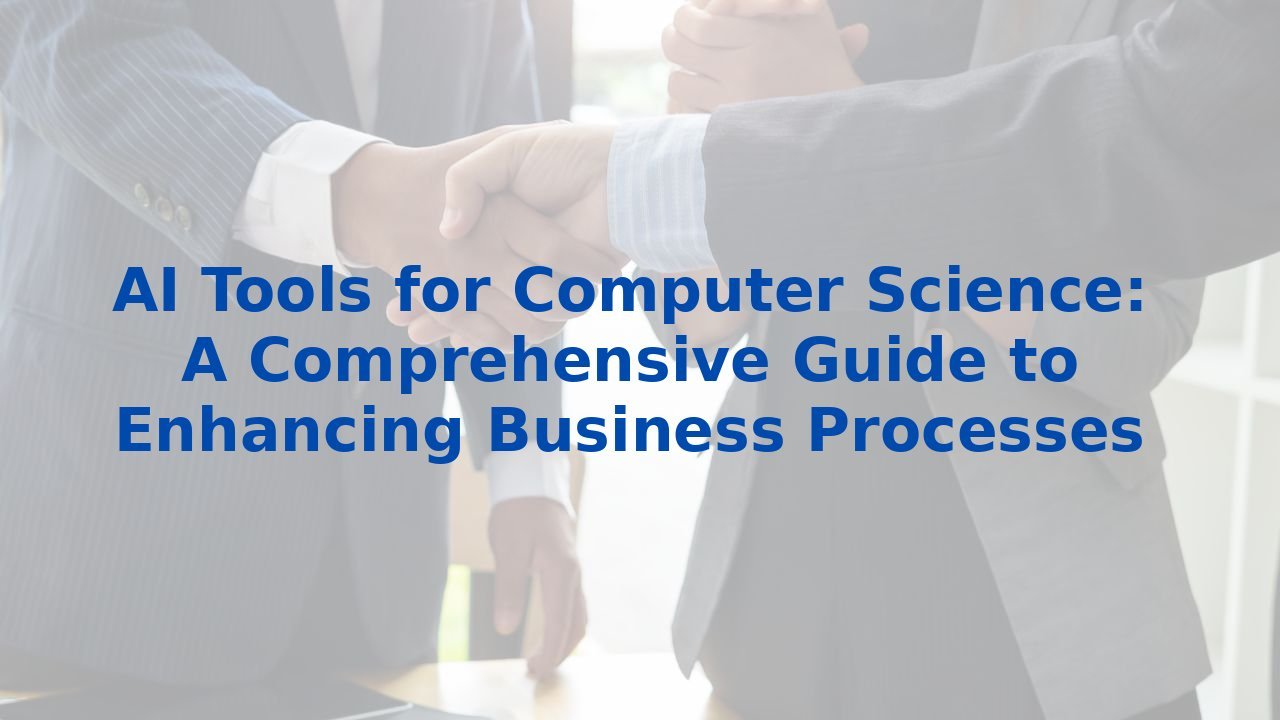AI Tools for Computer Science: A Comprehensive Guide to Enhancing Business Processes
Enhancing Business Processes with AI: A Comprehensive Guide
Introduction
In an era of rapid technological advancement, Artificial Intelligence (AI) stands out as a powerful ally for businesses striving to enhance their processes. The potential of AI reaches far beyond automation; it provides innovative ways to streamline workflows and boost efficiency across various sectors. This guide delves into the transformative impact of AI on essential business processes, emphasizing the urgency of integrating AI into company operations and the vital role employee training plays in this journey.
Understanding AI in Business
AI encompasses a wide array of technologies, from machine learning and natural language processing to deep learning. These technologies serve as a foundation for optimizing numerous aspects of business operations, including data analysis, customer service, marketing, and more. By leveraging AI, organizations can navigate the complexities of modern business landscapes with agility and foresight.
Enhancing Efficiency with AI
Data Analysis and Automation
One of the most significant advantages of AI is its ability to automate repetitive tasks. By taking over processes such as data entry and processing, businesses can allocate their resources to strategic initiatives. For instance, embedding text data into safety observations enables AI to automatically label clusters and extract trends, vastly improving the efficiency of manual analysis.
Customer Experience and Marketing
The integration of AI into marketing strategies can significantly change the game. Through the creation of AI marketing personas, businesses can gain a deeper understanding of their target audience's challenges and needs. This insight leads to tailored marketing strategies that speak directly to potential customers, ultimately resulting in higher engagement and conversion rates.
Content Creation and Gap Analysis
AI's role in content creation is expanding rapidly. It can generate initial drafts for blogs or online content; however, the richness and creativity brought by human writers cannot be replicated. Conducting gap analysis on existing content, with the assistance of AI-generated personas, can pinpoint areas that may be underrepresented or misaligned with audience needs, ensuring that the final content is both engaging and relevant.
Employee Development and Training
AI is not just about efficiency in customer-facing roles; it also plays a pivotal role in employee development. By analyzing individual growth goals and identifying themes, AI can help organizations unveil gaps in their training offerings. This targeted approach allows companies to offer robust employee development programs, which ultimately lead to increased job satisfaction and engagement.
Benefits of AI Adoption
Increased Efficiency
AI excels at automating tedious and repetitive tasks, which can drastically reduce the time and effort businesses expend on operational processes. This shift allows teams to focus on more strategic and impactful actions, leading to a significant increase in overall productivity.
Improved Decision-Making
Another groundbreaking advantage of AI is its ability to analyze vast data sets at unprecedented speeds. By providing insights that would be otherwise overlooked by human analysts, AI enhances decision-making processes with data-driven insights that can reshape business strategies.
Enhanced Customer Experience
AI has the power to elevate customer service by enabling chatbots and virtual assistants capable of providing round-the-clock assistance. This continuous support not only improves response times but also enhances overall customer satisfaction. Furthermore, AI-driven insights allow businesses to adapt their marketing strategies to better fulfill customer needs, ensuring a responsive approach to client engagement.
The Importance of Employee Training for AI
The transformative potential of AI can only be fully realized when employees are adequately trained to use these tools effectively. Here are three pivotal reasons why investing in employee training is essential for successful AI adoption:
Understanding AI Capabilities
For AI to be leveraged correctly, employees must have a clear understanding of its capabilities and limitations. Comprehensive training programs can equip teams with the knowledge necessary to effectively integrate AI into their workflows, ensuring they are well-prepared to navigate the technology's nuances.
Effective Prompting
The quality of outcomes from AI systems often relies heavily on the quality of the prompts given. Training should emphasize how to construct effective prompts that elicit desired responses, facilitating improved interactions with AI tools and optimizing the use of generated insights.
Integration with Existing Processes
Seamless integration of AI into existing workflows is vital for a smooth transition. Training programs that focus on enhancing current processes with AI can minimize disruptions, ensuring organizations maintain operational continuity while embracing technological advancements.
Conclusion
The potential of AI to revolutionize business processes is immense. It promises increased efficiency, improved decision-making, and elevated customer experience. However, to harness these benefits, businesses must prioritize employee training that covers the implications of AI adoption. By fostering an understanding of AI capabilities and integrating them into daily workflows, organizations can unlock unparalleled productivity and achieve long-term success in an ever-evolving landscape.
For businesses looking to invest in their future, a commitment to comprehensive AI training is not merely an option; it’s essential. Explore our training programs to equip your workforce with the skills needed to harness the power of AI effectively.



